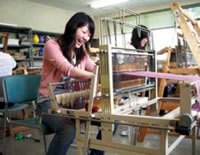Teaching Structure
 |
| Unit of Basic Occupational Therapy | |
|---|---|
| To assist the students consolidate basic knowledge in medicine, the various disorders and rehabilitation, we offer lectures in Functional anatomy, Integrated physiology, Neurological disorders and rehabilitation, and Psychological disorders and rehabilitation. We also offer Introduction to Occupational therapy and Basic occupational therapy skills to help students build foundation of occupational therapy. |
| Unit of Clinical Occupational Therapy | |
|---|---|
| < Physical disorders > Students will learn about ways of assessing the various disorders (motor paralysis, higher brain dysfunction and impairment in motor coordination etc.) resulting from diseases such as cerebral vascular disturbance, spinal cord injuries, rheumatism, and Parkinson’s disease, and the difficulties in daily activities such as eating and excretion. Based on the assessment, students will select an activity (activities) which may be effective, and study the theories and skills of applying the activity (activities) to therapy. <Psychological disorders > Students will learn about the characteristics of and ways of assessing the various psychological disorders, including schizophrenia, depression and bipolar disorders and the resulting difficulties in daily and social activities. Students will also systematically acquire the knowledge and skills of therapy options for the various disorders and recovery processes. <Developmental disorders > Students will firstly gain a general overview of therapy for various developmental disorders, and then focus on ways of assisting daily activities and fostering social skills especially for children and youths with ADHD, learning disorders, autism, and Asperger disorder. Students also learn about neurophysiological assessment and therapy for those with developmental disorders using sensory integrative approach. <Life support for people with disabilities > Students will learn about ways of assisting those with disabilities to continue with their life in their community, and at home, from the perspective of the patients. Students will learn how to assess the physical and psychological motor dysfunctions of the patients and their living and welfare environment, and how to identify the necessary welfare equipment, housing reform, support and care. |






